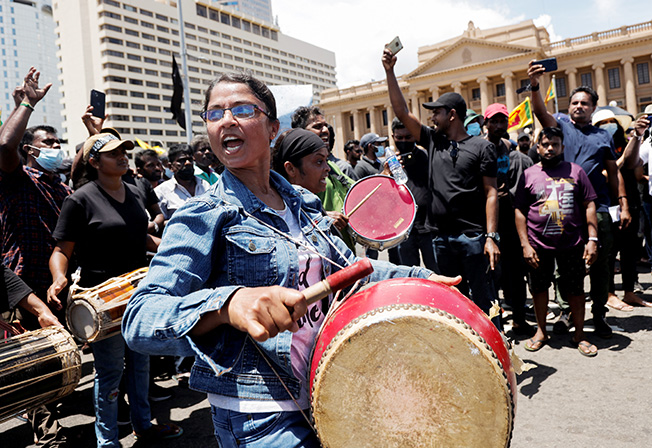Sri Lankan President Gotabaya Rajapaksa declared a state of emergency on Friday following a day of anti-government strikes and protests over the country’s deep economic crisis that saw police use tear gas on two occasions.
The measure is effective from Friday, a government notice said, adding the president took the decision in the interest of public security.
Police fired tear gas twice at dozens of protesters outside parliament on Friday, the latest in more than a month of sporadically violent anti-government protests amid shortages of imported food, fuel and medicines.
Hit hard by the pandemic, rising oil prices and government tax cuts, Sri Lanka has been left with as little as $50 million in useable foreign reserves, the finance minister said this week.
Details of the latest emergency regulations were not yet made public, but previous emergency laws have given greater powers to the president to deploy the military, detain people without charge and break up protests.
Hundreds of university students and other protesters gathered on Friday on the main road to parliament where they had started a sit-in on Thursday.
Some hung their underwear on the barricades as an insult to the political leadership. Messages like “Gota go home” – a rallying cry from the protests – were scrawled on some of the underpants and vests.
“We are here because we are sick and tired of politicians lying to us. We want the president and this government to go home,” said Purnima Muhandiram, a 42-year-old advertising professional.
Thousands of shops, schools and businesses closed earlier on Friday as public and private sector workers went on strike, demanding the president and the government step down for their handling of the island’s worst financial crisis in decades.
Shops were shuttered in major cities around the country and commuters were left stranded as private bus and train operators joined the strike.
The main train station in Colombo’s commercial centre was closed on Friday morning and only public buses were operational at the terminal nearby.
Healthcare workers also joined the strike, though emergency services remained operational.
Opposition leader Sajith Premadasa told parliament on Friday the opposition wants to move a no-confidence motion against the president and the government next week.
Rajapaksa has refused to step down, instead repeatedly calling for a unity government led by him.
“We have called multiple times for the formation of a unity government or an interim government but it is the opposition that has refused to extend support,” chief government whip and public security minister Prasanna Ranatunge told parliament on Friday.
Rajapaksa previously declared a state of emergency on 1 April but rolled it back after five days.







Click here to change your cookie preferences